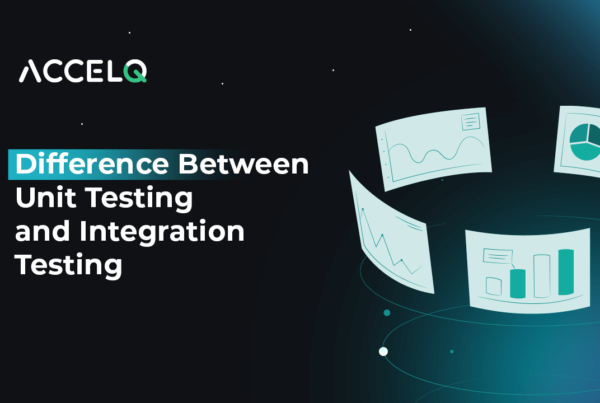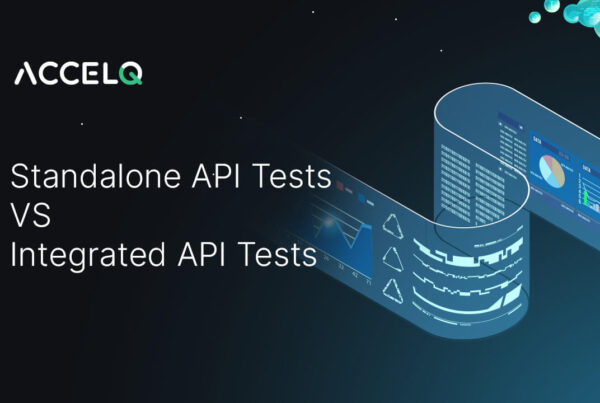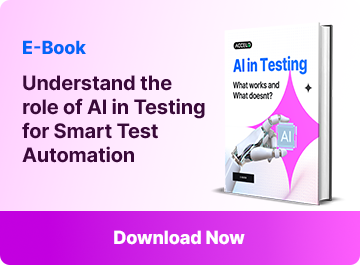AI Application Security Testing for Smarter Approach

Apps have become central to every business’s operations. This has also necessitated robust security testing of the apps to keep them secure. As apps become more sophisticated, standard security methods are insufficient. AI, with its capability to analyze volumes of historical data, deliver real-time insights, and predict cyber risks can help organizations in addressing newage threats and safeguarding their apps against malicious attacks.
Let’s understand challenges in traditional app security testing, how AI enhances it, and the techniques involved to successfully execute it.
Challenges in Traditional Application Security Testing
The traditional approach to application security testing faces several challenges, such as -
- Growing size and complexity of apps – With multi-layered designs, complex interconnections, and various technologies, these applications are challenging to test using traditional approaches. This complexity frequently results in gaps in security coverage, leaving risks unnoticed.
- Limitations of manual testing in identifying vulnerabilities – Manual testing, while necessary, is limited in its capacity to detect all vulnerabilities, especially in complex systems. Human testers might miss minor faults or misconfigurations, especially when handling huge codebases. Furthermore, manual testing is tedious and often unable to keep up with the quick development cycles found in current software projects.
- The rapid emergence of new security threats and attack vectors – Hackers are finding new ways to breach security. Standard testing has become more difficult as new security concerns and attack vectors emerge. It is beyond manual testing to identify and fix such risks.
- Zero-day vulnerabilities – It is a flaw that attackers exploit before it is identified and fixed by testers. Addressing such unknown vulnerabilities is tough. Traditional testing struggles to discover these risks in real-time, leading to a reactive rather than proactive security approach.
How AI Enhances Application Security Testing
AI enhances the app testing process through:
- Automated Vulnerability Detection – AI can continually scan apps, discovering vulnerabilities more quickly and accurately than manual testing. These technologies use machine learning algorithms to identify patterns linked with existing security risks, and they can even forecast prospective vulnerabilities based on previous data.
- Intelligent Threat Modeling – By analyzing huge amounts of historical data, AI can simulate a variety of threat scenarios and evaluate risks based on likelihood and impact. This proactive technique allows security teams to prioritize the most critical threats, reducing the attack surface and boosting overall protection.
- Anomaly Detection and Behavioral Analysis – By continually monitoring application activity, AI may discover deviations from expected patterns that may suggest a security flaw or possible threat. This real-time analysis allows speedier detection of attacks, particularly complicated ones that may evade normal security procedures. AI’s ability to continually learn and change makes it a useful tool for safeguarding applications against emerging dangers.
AI-Driven Security Testing Techniques
Popular AI-driven security testing techniques that are transforming the way organizations secure their applications are:
Machine Learning Algorithms
Machine learning (ML) algorithms are at the heart of AI-powered security testing. They facilitate better vulnerability evaluation and detection. Unlike traditional tools, which use predetermined criteria, ML models examine massive amounts of code, configuration files, and application activity to identify patterns that suggest vulnerabilities.
ML algorithms learn from previous data, which allows them to predict present and upcoming issues.. The models evolve as more data is analyzed, enhancing their ability to spot subtle and complex issues that human scrutiny may miss. This feature significantly enhances the effectiveness and speed of security testing.
Natural Language Processing (NLP)
NLP algorithms can help in detecting potential threats in unstructured data. For example, NLP can detect cases where security best practices are stated but not completely implemented, or where documentation and actual code behavior differ.
Understanding the context and purpose underlying written language allows NLP to help security teams identify potential breaches that might otherwise go unreported. This method is especially beneficial in big projects including significant quantities of documentation and configuration files that must be examined for security compliance.
Continuous Security Testing
ACCELQ’s AI-powered Autopilot continuous security testing ensures that apps remain secure at all stages of their lifespan by automating security scans and real-time vulnerability detection. Traditional testing is often conducted at various stages of development; however, using AI, tests can be automated and integrated into the CI/CD process. This allows for real-time monitoring and testing, with AI continually hunting for flaws when new code is introduced, or existing code is modified.
Continuous testing with AI ensures that security is not a secondary concern but an essential component of the SDLC, allowing teams to identify and handle issues as they arise, reducing the risk of vulnerabilities reaching production.
Conclusion
AI integration in application security testing is no longer optional for your company, but an absolute necessity. AI increases the efficiency of security testing, helping you to stay ahead of new risks and safeguard your apps more effectively. It also helps you cut costs and labor. ACCELQ, our AI-powered solution, speeds up automation, improves accuracy, and helps you build a robust testing process capable of handling existing and emerging cyber threats.
Our clients have realized 7.5x faster automation and 53% cost reduction with our platform in addition to 72% lower maintenance. To learn more about how ACCELQ can help your app testing team, get a demo today.
Geosley Andrades
Director, Product Evangelist at ACCELQ
Geosley is a Test Automation Evangelist and Community builder at ACCELQ. Being passionate about continuous learning, Geosley helps ACCELQ with innovative solutions to transform test automation to be simpler, more reliable, and sustainable for the real world.
Discover More
 Mastering Unit and Integration Testing: A Quick Guide
Mastering Unit and Integration Testing: A Quick Guide
Mastering Unit and Integration Testing: A Quick Guide
 Standalone API Tests vs. Integrated API Tests
Standalone API Tests vs. Integrated API Tests


































